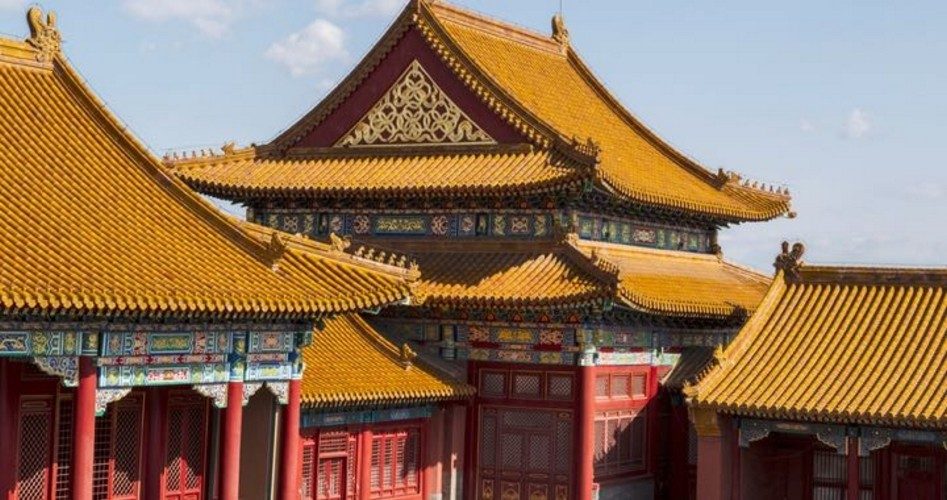
The unfair trade tactics of the communist Chinese government have repercussions far beyond trade imbalances and the ability to sell cheap fruit to China’s massive consumer base. The trade war that the Chinese have been waging poses an existential threat to U.S. sovereignty and future military superiority. That was made clear during a meeting of the House Armed Services Committee on Thursday, June 21.
It’s been standard operating procedure to look at Chinese incursions into American industry and academia on a case-by-case basis. That’s the wrong way to look at it according to Michael Griffin, the undersecretary of Defense for research and engineering.
He said that the Committee on Foreign Investment in the United States (CFIUS) is tasked with allowing or disallowing foreign investments in the United States, but it is too limited in scope; it doesn’t look at all Chinese purchases as a group. “In the CFIUS process, historically we look at one deal at a time,” Griffin told the committee. “I think it is the broader pattern that is more concern.”
In the last 10 years, China has invested more than $40 billion in U.S. companies. These investments, joint ventures, and acquisitions allow the Chinese to transfer technology under the guise of it being “just business.”
“We don’t look at Chinese investments from the perspective of the mischief that might be made simply by having foreign ownership and, in some cases, control of such avenues,” Griffin said. “We are not drawing distinctions in our industrial policies between friends and allies and partners and people who behave in an adversarial manner.”
The Chinese do behave in an adversarial manner, and they don’t do anything piecemeal. The Chinese government isn’t only engaging in an economic trade war but a technological, societal, and military quest to surpass America as the world’s great superpower.
“Made in China 2025” is a Chinese government initiative designed to modernize and upgrade its industrial base. The program looks to dominate emerging high-tech industries, the expected drivers of future economic success. Reminiscent of the Soviet Union’s five-year-plans, the program looks to increase Chinese prestige and power on the world stage and become the world’s most important economy.
In March of 2018, the Office of the United States Trade Representative issued a 200-page report detailing the unfair and underhanded trade policies of the Chinese government. In the report, the “Made in China 2025” initiative is cited 116 times for examples of this type of behavior.
Of course, Chinese purchases of those high-tech industries are concerning for reasons beyond their economic impact. There are frightening military concerns as well. If the Chinese government approach was to simply develop its own technologies that would be well enough. However, China’s attempts to upgrade its industrial and military base is laden with espionage and outright theft from other countries, mainly America.
“China is the embodiment of the military technology transfer,” said Anthony Schinella, national intelligence officer for military issues at the Office of the Director of National Intelligence.
What’s even more galling about Chinese incursions into American industry and academia is that they aren’t even attempting to hide it. Another Chinese program, begun in 2008, is the “Thousand Talents” program, which looks to “facilitate the legal and illicit transfer of U.S. technology, intellectual property and know-how,” to China says an analysis from the National Intelligence Council, which analyzes long-term threats.
“We have seen the Chinese target top talent in American universities and research labs in the private sector, including defense contractors and the U.S. government,” Griffin reported. In other words, the open society that we enjoy in the United States might be giving China access to the technology and the know-how that it needs to defeat us both economically and militarily.
So, the Chinese aren’t waging war with tanks and ships and missiles; not yet. The current conflict is more akin to the Cold War with the Soviets, with espionage and, amazingly, financial investment being the primary war-making forces. And the Chinese are currently winning that war without the United States even entering the fray as of yet.
Those concerned about President Trump igniting a trade war with China would do well to learn one thing. That war is already happening and has been for some time — it was just being waged by one side. A failure to engage the People’s Republic of China over their blatant and sometimes illegal tactics on the issue of trade and industrial and military espionage is tantamount to allowing the eventual takeover of the United States, not only industrially but militarily as well.
In this case, the analogy to war in our trade and economic dealings with China is apt. Presidents Clinton, Bush, and Obama were the Neville Chamberlains of our time. Now, we need a Churchill.



